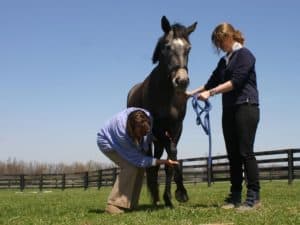Kentucky Stallions Declared Clear of CEM
The last Kentucky stallion known to have been exposed to contagious equine metritis (CEM) has been released from quarantine, State Veterinarian Robert C. Stout, DVM, has announced.
The western Kentucky Quarter Horse completed a testing and treatment regimen and was found to be free of the organism that causes the venereal disease. Four stallions that were infected with the organism were
- Topics: Article
The last Kentucky stallion known to have been exposed to contagious equine metritis (CEM) has been released from quarantine, State Veterinarian Robert C. Stout, DVM, has announced.
The western Kentucky Quarter Horse completed a testing and treatment regimen and was found to be free of the organism that causes the venereal disease. Four stallions that were infected with the organism were declared free of the organism earlier this month after completing treatment and testing. The infected stallions were housed on the Central Kentucky farm where the outbreak was discovered in December.
“Kentucky has addressed this outbreak with minimal disruption to the Quarter Horse breeding season,” Stout said. “The success of this operation is the result of more than three months of hard work by employees of my office, the University of Kentucky, the U.S. Department of Agriculture’s Kentucky field office, and private veterinarians.”
The infected stallions arrived at the index farm for the first time for the 2008 Kentucky breeding season. None of them had resided in Kentucky prior to December 2007. After extensive investigation of each possible source, the state veterinarian’s office has determined that the most probable source of introduction of the organism to Kentucky was a horse that entered the state from Wisconsin for the 2008 breeding season. The source of introduction to the United States has not been determined. USDA and Wisconsin officials continue to investigate the source and spread of the disease
Create a free account with TheHorse.com to view this content.
TheHorse.com is home to thousands of free articles about horse health care. In order to access some of our exclusive free content, you must be signed into TheHorse.com.
Start your free account today!
Already have an account?
and continue reading.
Written by:
Edited Press Release
Related Articles
Stay on top of the most recent Horse Health news with












